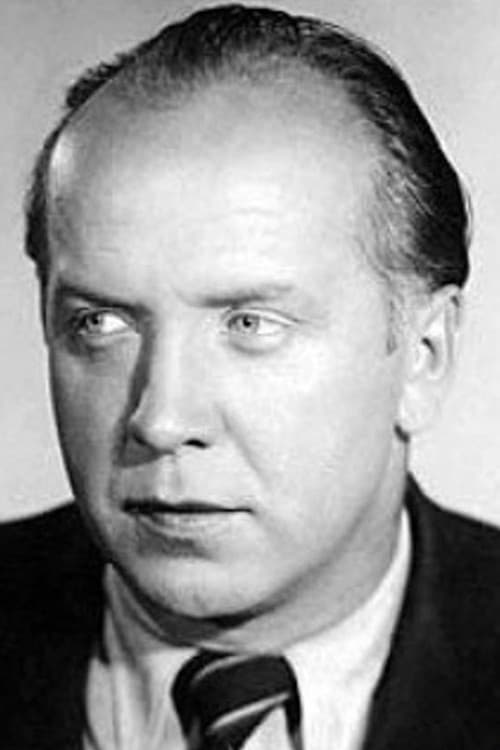|
|

|
Карпухин (1973)
Character: Vladimirov
The driver Karpukhin came under investigation because of a tragic accident, as a result of which a person died. The young investigator, believing Karpukhin, undertook to defend the defendant, but at some point yielded to someone else's opinion, after which the accused had to prove his innocence himself...
|
|

|
Римский-Корсаков (1953)
Character: Serov
Biographical film about the composer Rimskiy-Korsakov. Belongs to the gallery of costume historical and biographical films of the postwar cinema of the Soviet Union. The film tells about the last two decades in the life of Russian composer.
|
|

|
Запасной игрок (1954)
Character: N/A
Comedy about brothers Vesnushkin, Sasha and Vasya, who are playing for one team in a National Soccer Competition. However, Sasha falls in love with a beautiful girl and loses his confidence just before the final game, so his brother has to take the lead on the field in order to save the game.
|
|
|
|

|
Старик Хоттабыч (1957)
Character: член экзаменационной комиссии
A boy named Volka discovers an ancient vessel on the bottom of a river. When he opens it, a genie emerges from there. He calls himself Hassan Abdurrahman ibn Khottab, or in Russian style Khottabych. Grateful Khottabych is ready to fulfill any of Volka's wishes. But it appears that Volka should use the powers of the genie carefully, for they can have undesirable results.
|
|

|
Два капитана (1955)
Character: colonel
Based on the novel of the same name by Veniamin Kaverin.
From childhood, Sanya Grigoryev was able to achieve success in any business. He grew up a courageous and brave man. The dream of finding the remnants of Captain Tatarinov’s expedition led him to the ranks of polar explorers. The life of Captain Grigoryev is full of heroic events: he flew over the Arctic, fought against the Nazis. He was in danger, had to endure temporary defeats, but the hero’s persistent and purposeful character helps him to keep his vow made to himself in childhood: “Fight and seek, find and not give up.”
|
|

|
Летят журавли (1957)
Character: Nikolay Nikolayevich Chernov
Veronika and Boris come together in Moscow shortly before World War II. Walking along the river, they watch cranes fly overhead, and promise to rendezvous before Boris leaves to fight. Boris misses the meeting and is off to the front lines, while Veronika waits patiently, sending letters faithfully. After her house is bombed, Veronika moves in with Boris' family, into the company of a cousin with his own intentions.
|
|

|
Приходите завтра... (1962)
Character: director of institute
"Come Tomorrow" (1963), directed by Yevgeny Tashkov, is a much-loved comedy about Frosya Burlakova, a talented young woman from a remote Siberian village who comes to Moscow with dreams of becoming a professional singer. The film explores themes of hope, talent, perseverance and the pursuit of dreams, while also highlighting the contrast between the practical city dwellers and the idealistic villagers, suggesting that wisdom and truth can be found in both perspectives.
|
|

|
Большая семья (1954)
Character: factory director
Drama based on the novel by Vsevolod Kochetov “The Zhurbin Family”. The characters of the picture are a large family of hereditary shipbuilders. Three generations of the Zhurbin live under one roof: grandfather Matvei, his son Ilya, three sons of Ilya — Aleksei, Anton and Viktor. In a short time, representatives of the fourth generation are born. The share of the youngest son of Aleksei fall the most severe life tests. The background for family conflicts is the reorganization of production. All Zhurbin's have to change their profession to move on.
|
|

|
Бессмертная песня (1957)
Character: N/A
1920 year. Having been wounded, the Red Armyman Yusalov arrives in the Kuban village and organizes a music school here, learns the Internationale with his students, and sets up the first revolutionary performance. All this causes fierce hatred among the kulaks, they kill the Red Army. After many years, a new music school will be built in the village and named after the dead hero.
|
|











